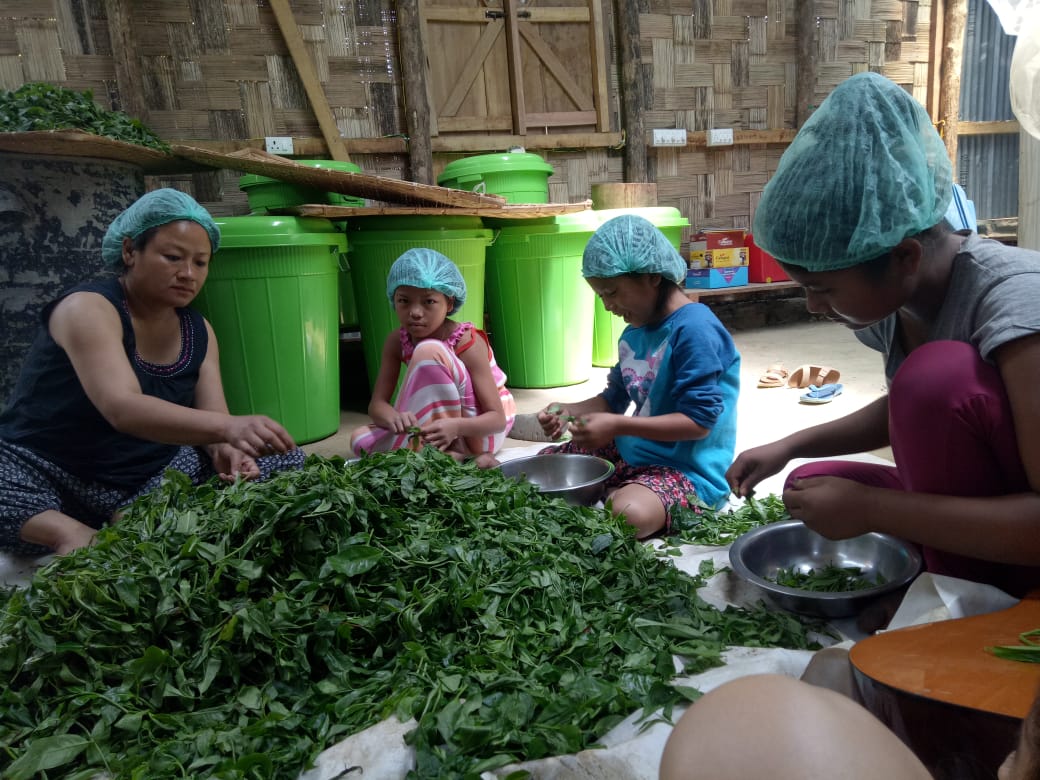
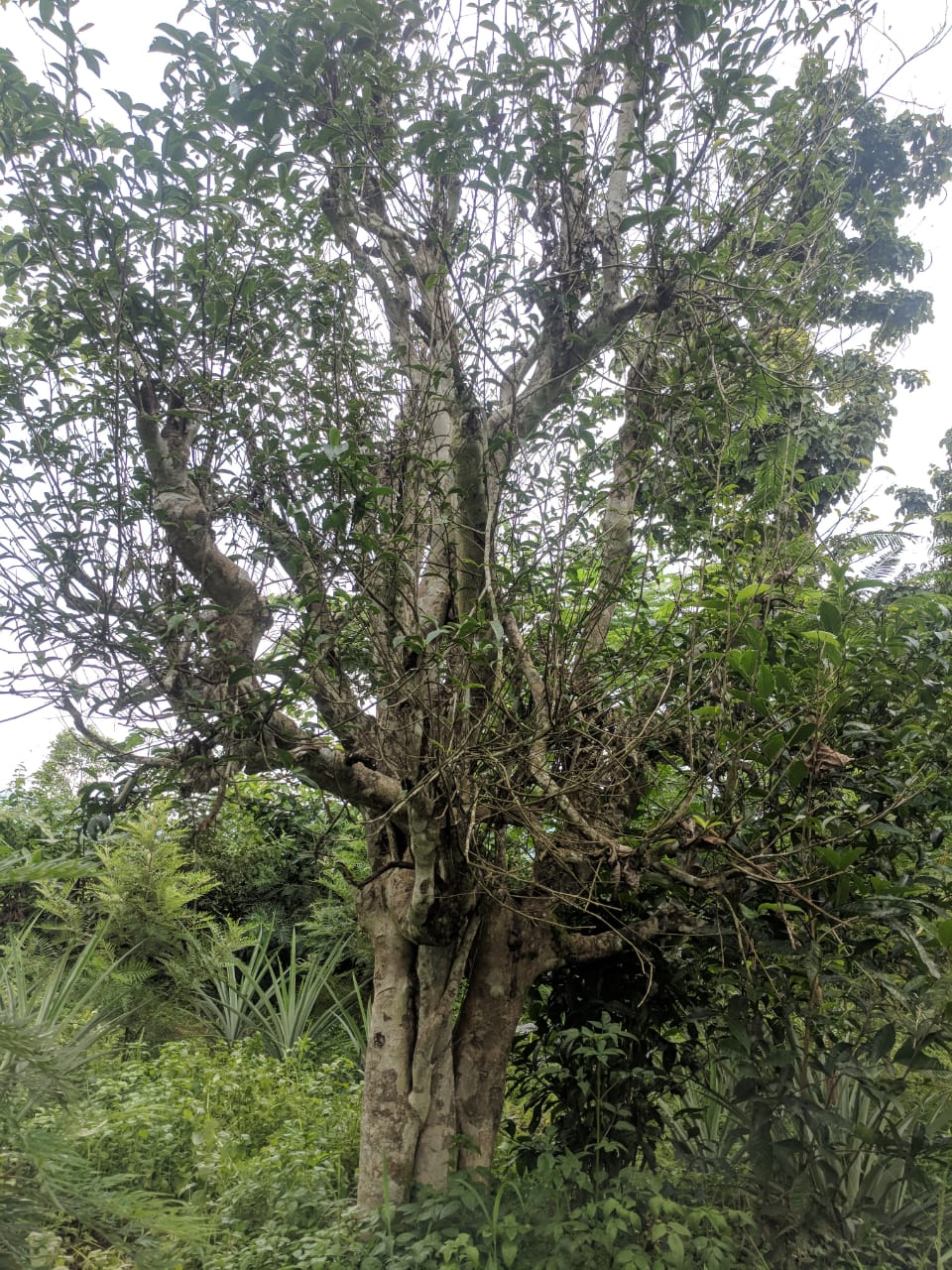
Manipur, a state in the far eastern corner of India, is famous for…well, truth be told that’s something I had to Google.
My interest was piqued by news of Forest Pick Wild Tea handcrafted by industrious villagers.
Manipur is bounded by Myanmar (Burma) to the south and Assam to the north. No matter where you stand, a few kilometers in any direction takes you up the side of a mountain. Dotted sparsely are hamlets of 20-30 families. Mt. Tenipu, Manipur’s tallest peak, rises to nearly 10,000 feet. There is fog all year round. It can be very windy and wet, and when the sun comes out, it’s scorching. Rainfall averages 60 inches (1468 mm). The town of Tamenglong averages 102 inches (2593 mm) annually. Like much of northeastern India, Manipur’s natural beauty is special.
An added bit of trivia: it’s the birthplace of polo, a game popularized — and still played — by the British.
Tea, however, doesn’t figure in the list of things for which Manipur is famous. Not yet, at least. Forest Pick launched about two years ago. It was founded by three sisters, Aijulie, Jemshe, and Julie Gangte with support from their brother Boi.
According to their website, local mountains hold thousands and thousands of tea trees that are located near many villages. Tea has grown wild in this region for centuries. Tea is an ancient plant. Fossils date the plant’s ancestors to 140 million years ago during the Cretaceous, the geological period in which flowering plants originated.
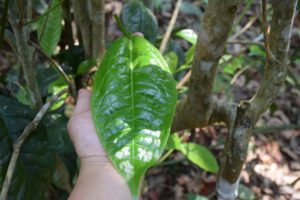
The tea species c. Assamica has grown in nearby Assam for the past 60 million years. Modern evolutions of tea trees live to 1,800 years of age in nearby Yunnan, China. Nobody really knows how and from where these trees arrived in Manipur, but it is certain the trees are much older than most of the villages.
It is interesting that what has long been a local way of life, is now finding an audience globally.
The Gangte family grew up in southern Manipur’s Churachandpur district where, they say, wild tea is drunk in place of water.
“Warm and sugarless smoky tea is more pleasant than plain cold water in these climates,” says Julie Gangte. The people call it ‘thing pi’ or ‘grand tree,’ a moniker more exalting than any other name held by tea. Why ‘grand’ I ask? It seems to be the best way to describe something that is important, always present, remedial, necessary, non-negotiable… all this and more.
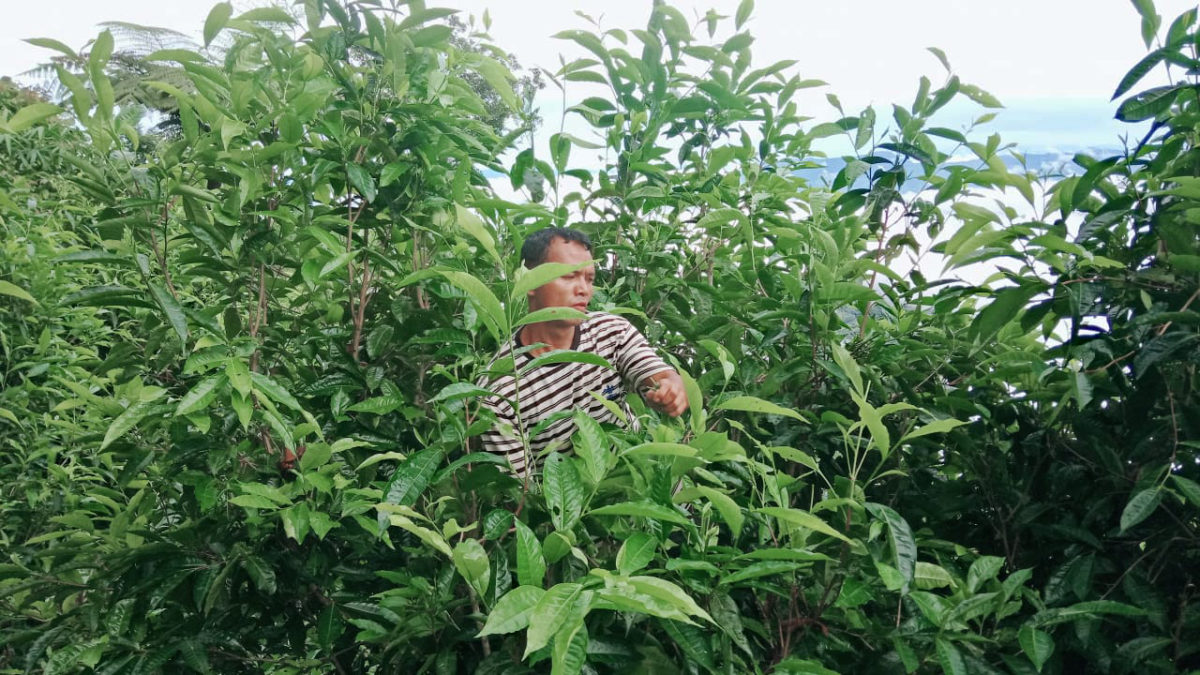
The Gangte siblings missed wild tea when they left home to study — Jemshe and Aijulie are graduates from Delhi University while Julie has a diploma in interior design from Guwahati. Boi is a management grad working in Guwahati. Tea is a reminder of home. Julie says, “Smoked tea is nostalgia. A reminiscence of our childhood, of mountain hamlets, thatched house, big trees, mountains…The smoky aroma transports us back in time when even basic amenities like electricity was a luxury.”
Lessons from Darjeeling
They knew they’d all return to Manipur after completing their studies, and by the end of 2016, the sisters were back in Churachandpur. “It was on a trip to Darjeeling,” says Julie, “when we visited the Happy Valley Tea Estate. Tea was processed in the orthodox style, there were few machines, the estate itself was very steep and tea bushes appeared to be growing perpendicular to the mountains. It reminded us of our home, and the wild tea growing in the mountains.” Learning that making didn’t need to be elaborate triggered the idea of Forest Pick. There was a market for tea, and good prices were paid for it. Over the next few months, the plan for Forest Pick began to emerge and in 2018, the siblings launched the website, selling their new brand of smoked black orthodox tea.
“Wild tea was never commercialized and hence the perception was that it can be drunk only if you go to the village. I don’t know why people didn’t produce these teas in large quantities and sell the tea in the local markets…there would have been a lot of buyers because almost everyone drank it…” adds Julie. Smoked tea is a staple but there was a lot of ground to cover to make it commercially suitable. A lot of learning was needed and they used available resources — Tony Gebely’s Tea: A User’s Guide, Shana Zhang’s (Wild Tea Qi) online course, as well as YouTube videos… Then they started making their teas and asked tea experts to taste them. Tea professionals from Guwahati were sought; tea experts Parag Hatibarua and Abhishek Proaxar, Julie says, were especially helpful. “We are still learning each day,” says Julie.
“I thought it was a great idea to bring to the modern tea-drinking world, teas from what is known as “non-traditional areas”. Teas from Manipur are “natural” teas, “wild” teas that no one in the tea-drinking world has known. Tribes in North East India, whether in Manipur, Mizoram, Assam, and Arunachal Pradesh have been drinking tea in their own indigenous form for God knows how long, surely much before the British discovered tea in Assam in the early 19th century. In China and Taiwan, old tea trees are greatly valued. Teas like the Da Hong Pao, a dark rock oolong from Wuyishan, Fujian in China attract premium prices.
“Wild teas grow naturally, organically, without the interference of modern commercial agricultural practices. This means no chemical fertilizers, no pesticides, no weedicides, no touch of modernity. We don’t know how long ago or how these Camellia sinensis plants came to be there, probably indigenous to those parts.
“Teas from Manipur are as unique as other wild teas found in Southeast Asia. The challenge for Forest Pick is that there is a niche market for these teas. They are very new to the market, and haven’t yet penetrated the modern tea drinking world. And Forest Pick is a very small family unit trying to help the small farmers in Churachandpur.
“I encourage people to try these teas. Besides the fact that they are natural, organic, it is our responsibility not to let the art of indigenous tea making die. I consider this my mission and payback for a subject that has given me so much joy.”
Communities Coming Together
Forest Pick is a family run business and the dynamics of the operation are low-key and informal. The sisters are in charge of production and operations. The company now employs two workers full-time. When there’s work, the villagers are hired on contract. For the team, the biggest challenge is plucking the leaves. Tea gardens have evenly spaced tea bushes, pruned to make plucking easy. But wild tea trees are tall (10-15 feet on the periphery and in the deep forest, as tall as 20-30 feet). Trees are scattered across scarcely populated mountains. Finding people who are familiar with the terrain and know what to do is challenging. And then comes the long trek back to the village along winding roads. Workers must return quickly with the freshly plucked leaves.
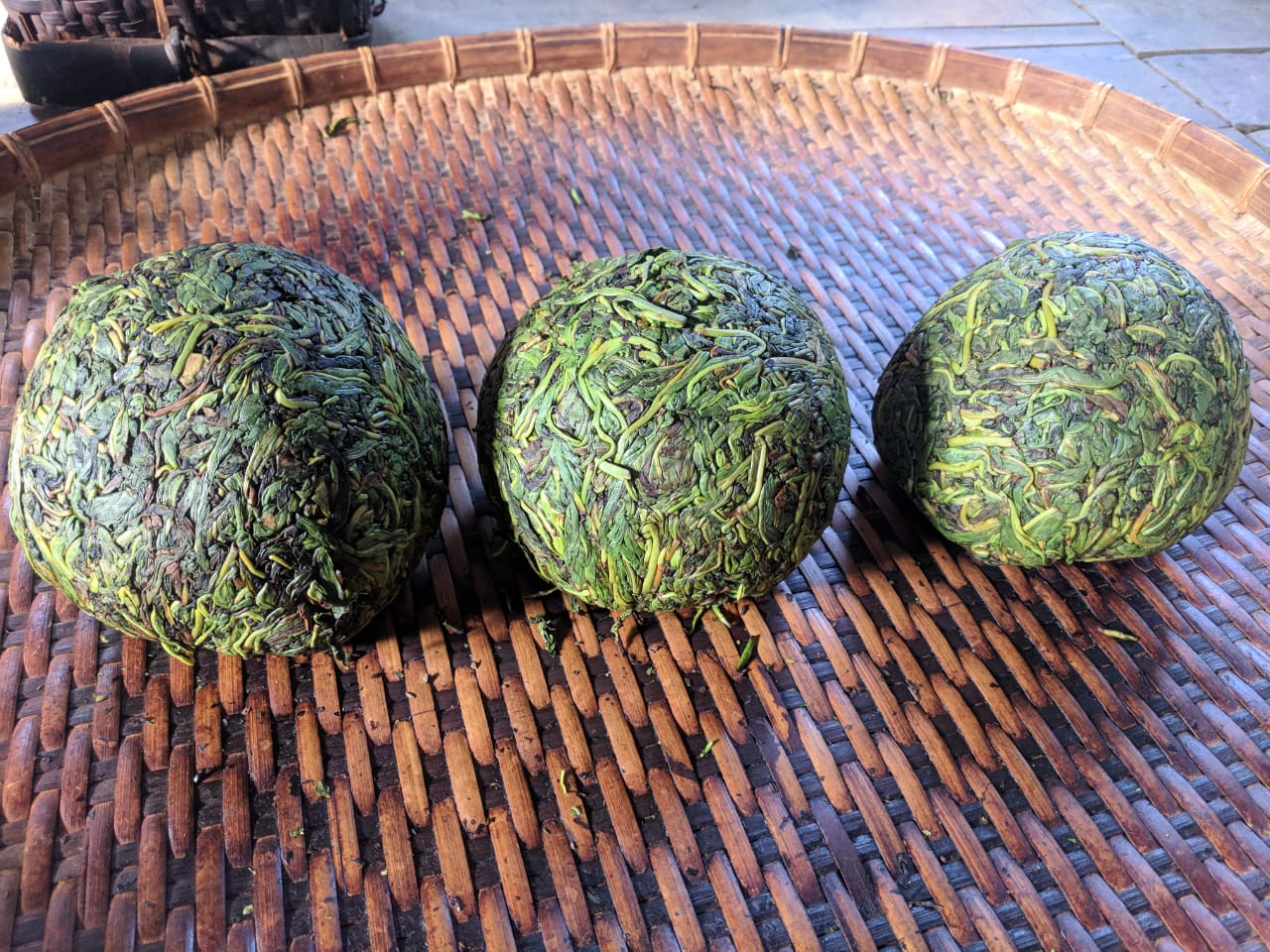
The season runs April to November, and barring winter, tea is available for plucking although the monsoons can make it difficult. Wild tea leaves are up to 8 inches (20 cm) in length, much larger than tea grown on estates and with longer stems. The typical plucking standard is a bud and 2 or 3 leaves, depending on how tender they are. Once brought to the processing center, the leaves are sorted based on the teas they eventually make.
The tea making area is kept simple — pan-firing, charcoal roasting, drying. Villagers use locally made/sourced equipment such as bamboo trays, bamboo baskets, storage baskets, charcoal heaters, firing pans. One air dryer purchased in Delhi has a capacity to process 10-15 kgs per batch but even this is being replaced by an electric dryer that was made by local electricians and carpenters. The catalog offers black, smoked black, oolong, toasty green, white and three unusual blends — with galangal, lemon basil, and litsea (an aromatic shrub known as “mountain pepper”). Borrowing from the style of cooking in these parts — steaming with fresh spices — they decided to add these same spices to tea.
There are four local families who work with the team to do the picking. And the team hopes to be able to offer employment to at least 100 families.
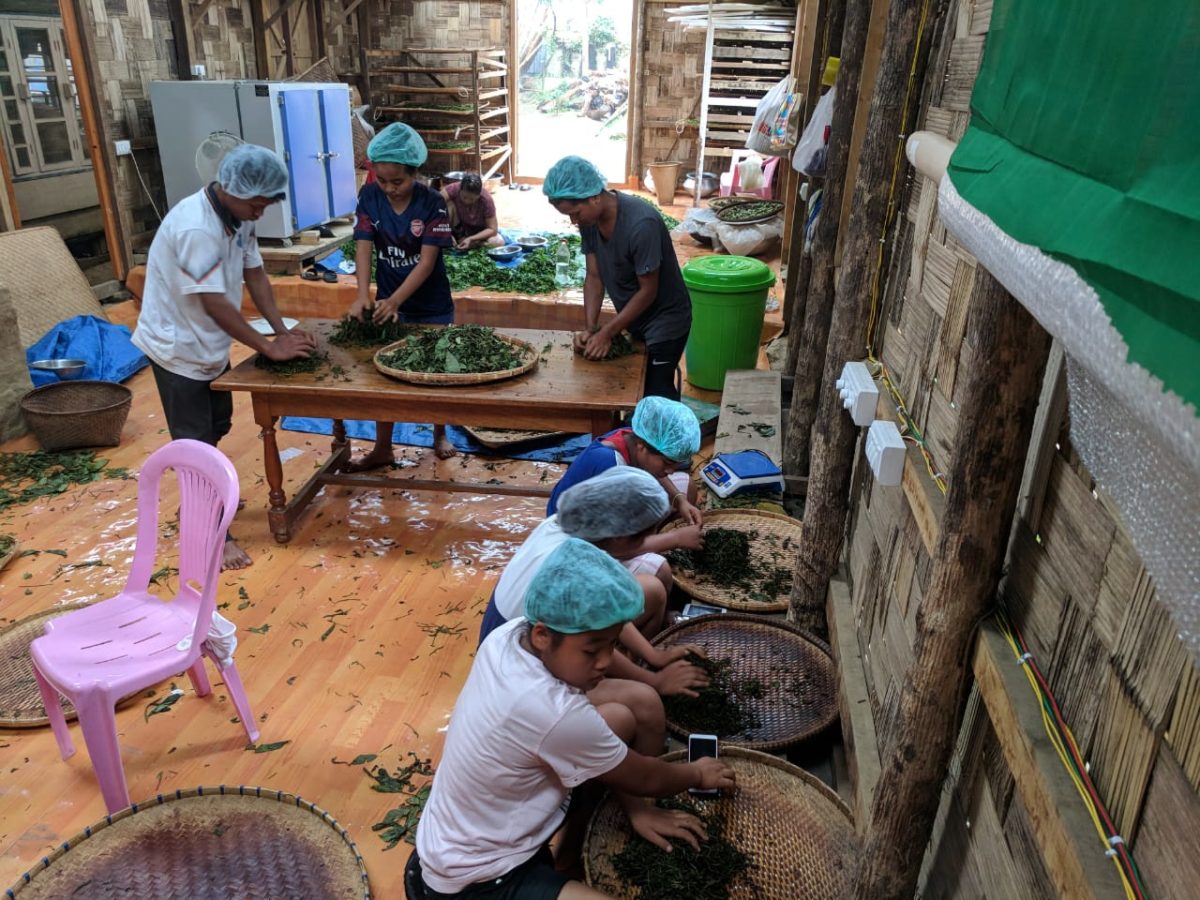
The Resilience of Forest Picked Tea
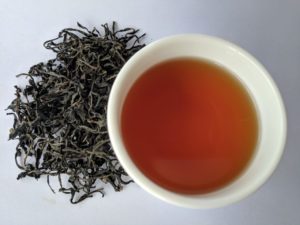
In Manipur, villagers practice fire-fallow cultivation, a form of slash-and-burn style farming, or “jhoom” as it’s called in these parts. Forest Pick wants to take the community towards more sustainable livelihoods, says Julie: “These wild teas are seed propagated, which is the natural way of propagation rather than stem propagation of clones. We see that wild tea grows in perfect harmony with all the diversity in a forest.”
She talks about the land that’s farmed and abandoned when soil nutrient levels drop, and how wild tea can reforest swiddens. “We have seen in our mountains where tea thrives in a very diverse environment, where tea grows under the shade of much bigger trees. Tea is a very resilient and high-resistance plant when they grow in a bio-diverse environment. It doesn’t perish or die easily, even if cut down or burnt down; it eventually grows back.”
Word of their tea has spread via Facebook. The tea speaks for itself. Although pitched as a retail brand focused on the Indian market, there’s a lot of interest from wholesalers stocking large batches of these wild teas. It seems inevitable that the business will cater to both domestic and wholesale within the country and overseas, entering the specialty tea market with a new story.
“We are still testing the market, we are still figuring it out. We are testing our ability and we are learning each hour, each day,” says Julie. “The initial response and experiences have been good. We know that we can improve in all departments. The one thing we have established is that the product has inherent strength and demand, it’s unique and different. It’s for us to leverage it.”
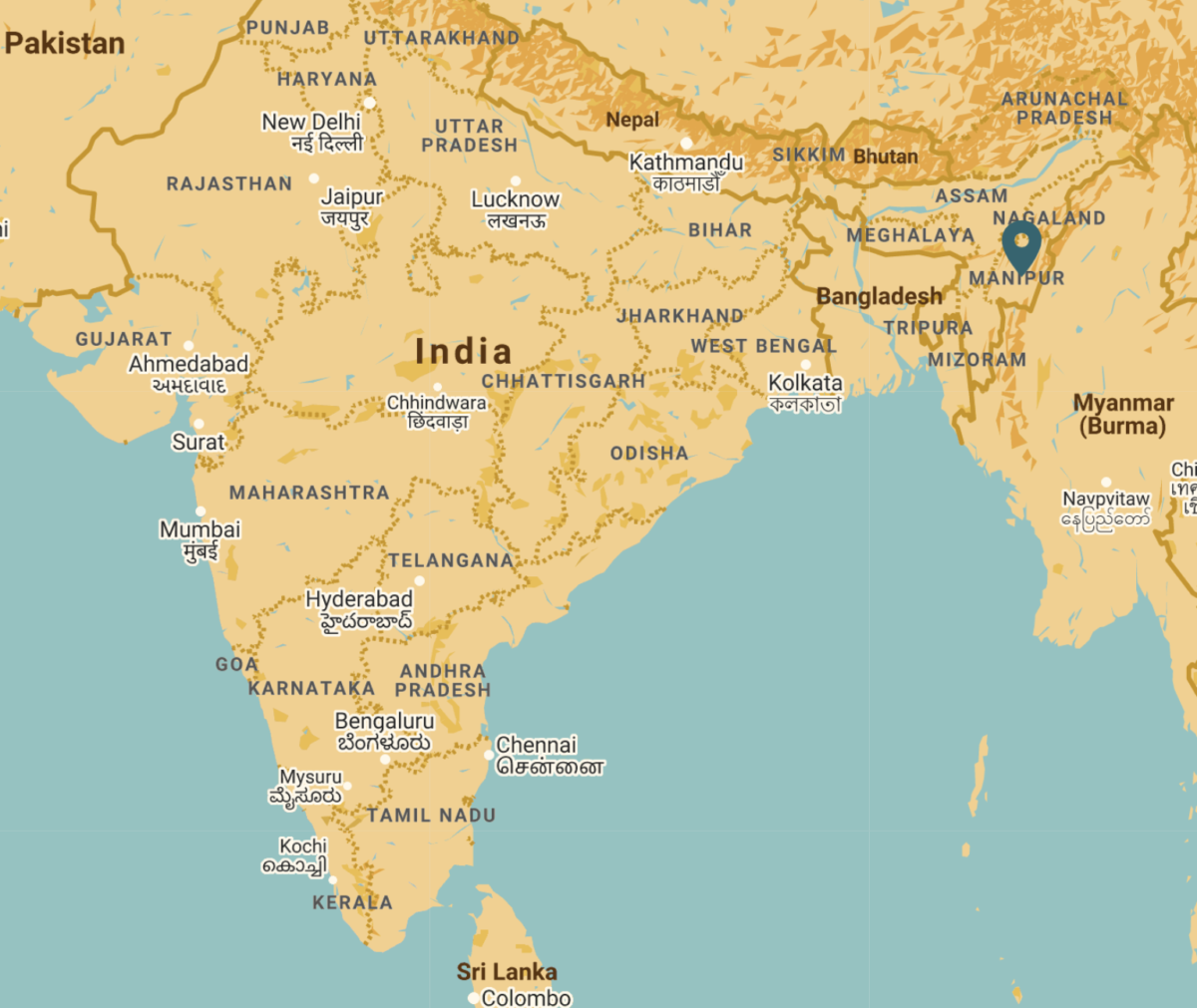
The brand’s biggest challenges lie in production and operations. Sourcing leaves from the forest always presents logistical issues. And since buds are prized, plucking must be done every 15-17 days. Once the tea is made, shipping poses additional challenges. Churachandpur is a small town and the state capital, Imphal, is about 60 km away. India Post is their best bet but is more time consuming and not as accountable as courier services can be. This means that logistics can assume nightmarish proportions.
A new addition to the Indian tea story
But this is the beginning of what will make a difference to the town. Already in Churachandpur, the Gangtes’ friends and neighbors are beginning to see how their wild teas are finding takers, across the borders, outside Manipur, and outside India. Government officials are taking note. No one imagined an enterprise could emerge from something they took for granted, from a small unknown town. It makes the Gangte family take their work seriously.
Says Julie, “It means responsibility and more importantly accountability. It is also a bit scary at times…if we fail, the breach of trust to those farmers, to those in our community who may be looking up to us…it’s irreversible. Irrespective of the market size or market opportunity, Forest Pick is not another start-up, but an eco-system we are creating in which all the villagers participating will benefit.”
And so begins a new chapter in the grand tale of Indian tea.
Source: Forest Pick
Tea Market
Get More Value from Your Tea: BRU Maker One
+41794574278
Jacque's Organics
(647) 804-7263
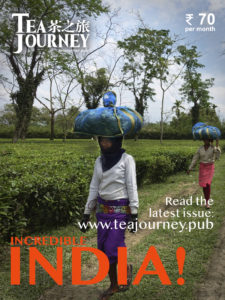
Lovely to note and read.
Wishing the Gangte sisters, all the very best in their endeavour.
Well done Parag.
Hello Dan,
What a breath of fresh air your journals are in these odd and trying times.
I have fallen behind in my reading of these wonderful publications and am now luxuriating in reading the details of each issue.
Thanks so much for being there for me, and more importantly, for our industry.
best,
Richard